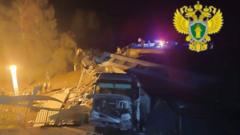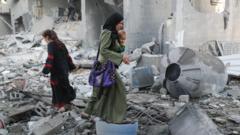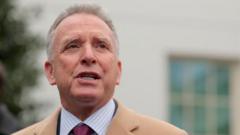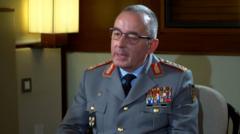Amidst rising tensions, Ukraine's leadership expresses skepticism regarding Russia's intentions as a pivotal round of peace talks approaches.
**Tensions Rise as Ukraine Questions Russia's Commitment to Peace Talks**

**Tensions Rise as Ukraine Questions Russia's Commitment to Peace Talks**
Ukraine accuses Russia of sabotaging negotiations, raising doubts over sincerity in upcoming discussions.
In a troubling twist ahead of the upcoming peace negotiations in Istanbul, Ukrainian President Volodymyr Zelensky has voiced doubts about Russia's genuine commitment to advancing the dialogue aimed at ending the ongoing conflict. The Kremlin has confirmed a delegation's presence at the talks scheduled for Monday, but has yet to provide Ukraine with its ceasefire proposals—vital information that Kyiv has requested as a prerequisite for productive discussions.
Zelensky accused Moscow of obstructing the process, stating, "For a meeting to be meaningful, its agenda must be clear, and the negotiations must be properly prepared." Ukraine's government has articulated its readiness for a full and unconditional ceasefire, recently submitting its own framework for the talks. The initial round of negotiations two weeks prior yielded no substantial results, though it did facilitate a crucial exchange of prisoners.
The war, initiated by Russia's invasion in February 2022, has left Moscow in control of approximately 20% of Ukraine's land, notably Crimea, which it annexed in 2014. Ukrainian Foreign Minister Andrii Sybiha emphasized the necessity of an unconditional ceasefire as the foundation for any future negotiations. During a press conference alongside Turkish Foreign Minister Hakan Fidan, he asserted Kyiv's eagerness to engage in talks with the aim of concluding hostilities this year.
Despite the anticipation surrounding the upcoming talks, both Zelensky and Russian President Vladimir Putin are not expected to attend. Turkey's Fidan expressed hope for a high-level summit involving former President Trump, Putin, and Zelensky, highlighting the desire for more significant dialogue.
Kremlin spokesperson Dmitry Peskov indicated that Russia's conditions for a ceasefire will not be publicly disclosed, adding that a high-level meeting would only be feasible if preliminary discussions yield meaningful advancements. Peskov also acknowledged comments from Trump’s envoy to Ukraine, Gen Keith Kellogg, who noted that Russian apprehensions regarding NATO’s expansion were warranted. He reiterated that the prospect of Ukraine joining NATO is not currently viable.
In light of ongoing discussions, Trump and Putin previously engaged in a two-hour phone conversation about a US-proposed ceasefire, which Trump claimed was fruitful. He insisted that negotiations should "immediately start," yet Putin's response was limited to collaborating with Ukraine to construct a memorandum on potential future peace, deemed by Kyiv and its allies as stalling tactics aimed at solidifying Russian territorial gains.
As hostilities continue, the new German Chancellor Friedrich Merz pledged to assist Ukraine in developing long-range missiles to defend against future Russian offensives. The Kremlin warned that any lifting of missile range limitations would jeopardize prospects for peace, further complicating the situation as both sides brace for the upcoming talks amidst dwindling optimism.



















